Christian Wiman
All My Friends Are Finding New Beliefs
Who are the friends that, despite different paths chosen, have remained steadfast in your life?
In this poem Christian Wiman recalls the changing beliefs of his friends: this one has a new diet, this one has a new relationship, this one is slipping away, this one is verdant. While doing so, he holds the love for his “beautiful, credible friends” as the thing to hold on to while the planet turns faster.
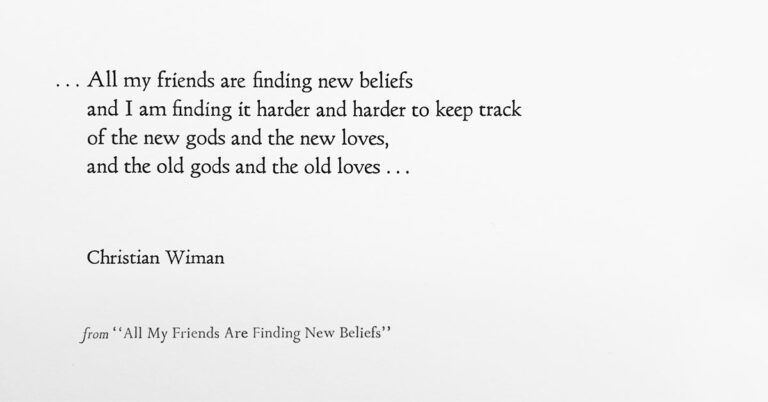
Image by Expedition Press/Expedition Press, © All Rights Reserved.
Guest
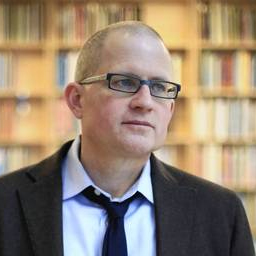
Christian Wiman is the author of numerous works of poetry and prose, including He Held Radical Light: the Art of Faith, the Faith of Art and a new book of poems, Survival Is a Style. He is a professor at Yale Divinity School.
Transcript
Pádraig Ó Tuama, host: My name is Pádraig Ó Tuama, and poetry, for me, has become a scripture that is in partnership with my life. I trust that somebody around the world has written a poem that is going to be sufficient for the moments of my life where I need something that hasn’t been said to me before. And if I can’t find it, I try to write it.
[music: “Praise the Rain” by Gautam Srikishan]
Ó Tuama: “All My Friends Are Finding New Beliefs” by Christian Wiman:
“All my friends are finding new beliefs.
This one converts to Catholicism and this one to trees.
In a highly literary and hitherto religiously-indifferent Jew
God whomps on like a genetic generator.
Paleo, Keto, Zone, South Beach, Bourbon.
Exercise regimens so extreme she merges with machine.
One man marries a woman twenty years younger
and twice in one brunch uses the word verdant;
another’s brick-fisted belligerence gentles
into dementia, and one, after a decade of finical feints and teases
like a sandpiper at the edge of the sea,
decides to die.
Priesthoods and beasthoods, sombers and glees,
high-styled renunciations and avocations of dirt,
sobrieties, satieties, pilgrimages to the very bowels of being …
All my friends are finding new beliefs
and I am finding it harder and harder to keep track
of the new gods and the new loves,
and the old gods and the old loves,
and the days have daggers, and the mirrors motives,
and the planet’s turning faster and faster in the blackness,
and my nights, and my doubts, and my friends,
my beautiful, credible friends.”
[music: “Memoriam” by Gautam Srikishan]
Ó Tuama: So this poem, is really a poem written in middle age and looking at friendships that have lasted into middle age, and what friendships in middle age can mean, not that everybody in this poem is the same age; we’ve no idea. Some of these people might be older than the poet, some might be younger. But I find that it’s a poem that is really paying attention to the serious questions of friendship that happen at a particular stage in life, maybe in your late 40s or 50s. What does it mean to preserve these friendships, and what does it mean to live with each other through the changes that come in midlife?
In his book My Bright Abyss, Chris Wiman has this line to say that when he began to be more open to belief, he began to become more open to doubt, also, because, he said, belief and doubt are part of the same thing. He said, when he wasn’t interested in those things, neither belief nor doubt nor unbelief was of any interest to him. But it was in opening up to one that you open up to many. And I think his writing about the marrow of things, the questions of religion, the questions of meaning, has always, for me, been very brave, because he always proposes the thing, as well as the anti-thing. And in this, he’s seeing all this happening in other people, because it’s been happening in him, too. And he’s saying, Yeah, me, too. And what’s really important to him, in the middle of these big questions of belief, is his beautiful, credible friends, the ones who are really worth believing in.
And they’re believable because they’re your friends, not because of anything else, not because they’ve got this new diet or because they’ve got this new religion, or not because the mirror is kind to them and not to other people or because they have an understanding of the afterlife or that they have survived an illness or because an illness has killed them.
They’re worth believing in, just because they’re loved.
[music: “Outstretched Hand” by Gautam Srikishan]
Ó Tuama: When I turned 40, I was shocked by what happened. I had always thought, before that, that anybody who had a bit of a crisis when they were turning any particular age was kind of making it up, or kind of performing it. And for me, turning 40, nothing happened, in a certain sense, but I just realized, almost accidentally, that I’d turned a corner, that I’d lived through my 30s, which felt to me like the first properly adult decade of my life. And then, having lived through one of those, I thought, I’m going to be 50 tomorrow, and 60, the day after that. And I’d never imagined myself realizing that those decades would be opening up to me. I realized that this is what midlife was: that the decades that had suddenly seemed old, previously, didn’t seem old, and they also didn’t seem distant. They’re just part of the way that time works.
And I can really connect with this poem from Chris Wiman, where he says, “and the days have daggers, and the mirrors motives, / and the planet’s turning faster and faster in the blackness” — he’s just saying about the way that you begin to look at yourself. You begin to see how your own body is changing, and you begin to have a different relationship with the question of time. And decades open up and pass by and are finished, and new decades open up. And change is happening. And this poem, is stuck into the middle of this question about life and time.
And what I really love is that he doesn’t just leave it there, just on the edge, staring into the abyss. He brings it back to his friends. And he’s saying that that’s what holds him. and this poem is so hinged on saying friendship is important, but not as an inspirational poster. This is bringing us to the abyss and saying, even here, still, I’m saying that what I know I can carry is “my friends, my beautiful, credible friends.”
[music: “Into the Earth” by Gautam Srikishan]
Ó Tuama: I think one of the invitations of this poem is, A, to not judging, to notice the things that become important to your friends as time goes by, and to observe them, maybe with curiosity or maybe with questions, but to observe them; and B, to see that friendship is deeper than the question as to whether you all believe in the same things or not anymore, or as to whether you all have the same imagination about what’s important — that friendships can survive these things, and friendships can hold people together throughout various changes of their life.
Ó Tuama: “All My Friends Are Finding New Beliefs” by Christian Wiman:
“All my friends are finding new beliefs.
This one converts to Catholicism and this one to trees.
In a highly literary and hitherto religiously-indifferent Jew
God whomps on like a genetic generator.
Paleo, Keto, Zone, South Beach, Bourbon.
Exercise regimens so extreme she merges with machine.
One man marries a woman twenty years younger
and twice in one brunch uses the word verdant;
another’s brick-fisted belligerence gentles
into dementia, and one, after a decade of finical feints and teases
like a sandpiper at the edge of the sea,
decides to die.
Priesthoods and beasthoods, sombers and glees,
high-styled renunciations and avocations of dirt,
sobrieties, satieties, pilgrimages to the very bowels of being …
All my friends are finding new beliefs
and I am finding it harder and harder to keep track
of the new gods and the new loves,
and the old gods and the old loves,
and the days have daggers, and the mirrors motives,
and the planet’s turning faster and faster in the blackness,
and my nights, and my doubts, and my friends,
my beautiful, credible friends.”
[music: “Praise the Rain” by Gautam Srikishan]
Lily Percy: “All My Friends Are Finding New Beliefs” comes from Christian Wiman’s book, Survival is a Style. Thank you to Farrar, Straus and Giroux who gave us permission to use Christian’s poem. You can find a link to the poem in our show notes, along with Pádraig’s guiding question for this episode.
Poetry Unbound is Chris Heagle, Erin Colasacco, Serri Graslie, Eddie Gonzalez, Lilian Vo, Christiane Wartell, Karen Navarre, Karyn Towey, Sue Ariza, and me, Lily Percy. Our music is composed and provided by Gautam Srikishan and Blue Dot Sessions. This podcast is produced by On Being Studios, which is located on Dakota land. We also produce other podcasts you might enjoy, like On Being with Krista Tippett, Becoming Wise, and This Movie Changed Me — find those wherever you like to listen or visit us at onbeing.org to find out more.
Books & Music
Recommended Reading
The On Being Project is an affiliate partner of Bookshop.org and Amazon.com. Any earnings we receive through these affiliate partnerships go into directly supporting The On Being Project.






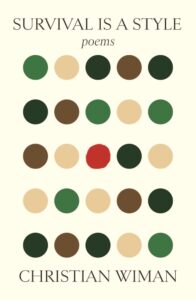
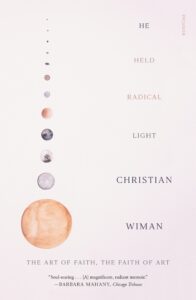


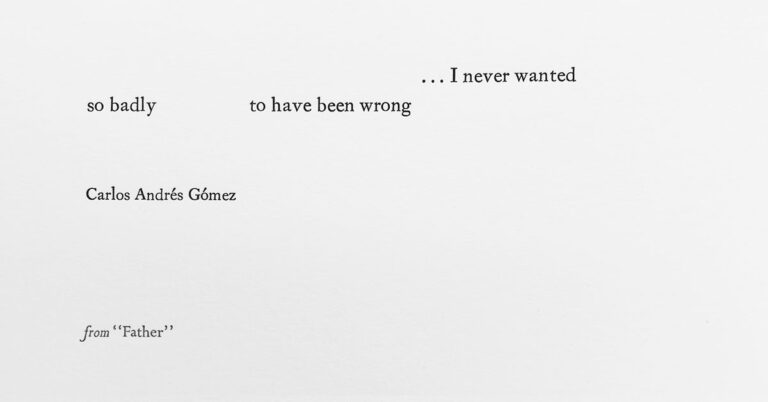
Reflections